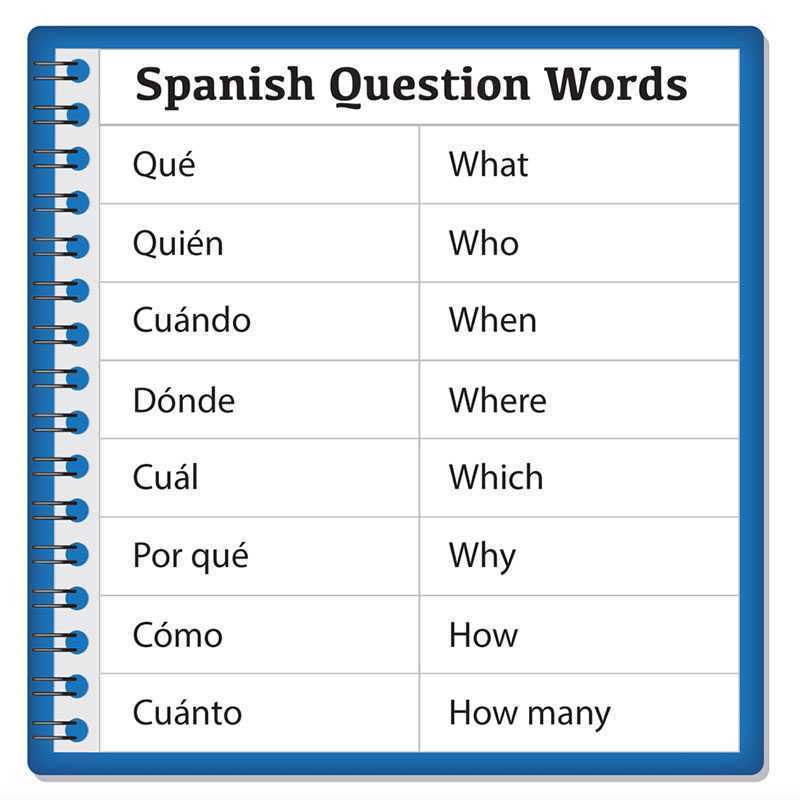The worksheet contains three parts: What are question words and how are they used? Web spanish interrogative words interactive and downloadable worksheets. Web thus, to get an answer like “ vivo en miami ” (i live in miami), first we must identify that we are talking about a place and then use the appropriate interrogative word, that is, “dónde,” to ask “where do you live ( you)?” (en dónde vives (tú)?). Question words in spanish can be tricky for students and definitely requires a lot of practice.
Question words | teaching resources. Let’s learn some spanish words and expressions about interrogatives. Web spanish interrogative words interactive and downloadable worksheets. Select the correct interrogative word.
Web spanish interrogative words interactive and downloadable worksheets. Select audio or video to learn how to pronounce the following words in spanish. Web cómo (how), cuándo (when), por qué (why), dónde (where), cuál (which), qué (what), cuántos (how many) and others.
Select audio or video to learn how to pronounce the following words in spanish. Web thus, to get an answer like “ vivo en miami ” (i live in miami), first we must identify that we are talking about a place and then use the appropriate interrogative word, that is, “dónde,” to ask “where do you live ( you)?” (en dónde vives (tú)?). More practice selecting the correct interrogative word. Spanish phrases and questions for basic conversations. Web here’s a list of words you can use to ask questions in spanish!
(i’ll show you how and when to use them later on.) dónde (where) cuándo (when) cómo (how) qué tal (how) cuánto (how much/many) cuántos (how many) cuánta (how much/many) cuántas (how many) por qué (why) qué (what) cuál (which) Let’s learn some spanish words and expressions about interrogatives. Common spanish question words for everyday conversations.
There Is A Picture Of A Dancer (Bailarina) And Students Need To Either Answer The Question About Her Or Create Their Own Question.
Question words (also called interrogative words) are words we often use at the beginning of a question, indicating the type of information we are asking for. All question words in spanish have an accent mark and are preceded by an inverted question mark. Work on the difference between qué, cuál, and cuáles. (i’ll show you how and when to use them later on.) dónde (where) cuándo (when) cómo (how) qué tal (how) cuánto (how much/many) cuántos (how many) cuánta (how much/many) cuántas (how many) por qué (why) qué (what) cuál (which)
Español Como Lengua Extranjera (Ele) (1061939) Main Content:
The topics we will cover include: Question words (1963037) question words. An exercise to support the introduction of basic question words. Web interrogative words spanish interactive and downloadable worksheets.
Whenever Asking Questions In Spanish, It Is Importantly To Use The Right Question Word To Get The Information You Needing, Even Like In The Examples In Aforementioned Picture Below.
Spanish question words are used in countless contexts such as getting to know someone, asking for information, and clarifying details. They are an essential part of your language skills set so let's take a look at some key ones! Possible service interruption is expected. The first worksheet is to work on the difference between cuánto, cuántos, cuánta, and cuántas.
Formal And Informal Spanish Phrases.
Question words | teaching resources. Interrogative words (1536214) selection of correct interrogative word. Web this spanish question words / interrogatives worksheet helps students familiarize themselves with the 12 most common question words. Select module to see the complete list of resources for this module.
Spanish phrases and questions for basic conversations. What are question words and how are they used? They are equivalent to the english “what? (i’ll show you how and when to use them later on.) dónde (where) cuándo (when) cómo (how) qué tal (how) cuánto (how much/many) cuántos (how many) cuánta (how much/many) cuántas (how many) por qué (why) qué (what) cuál (which) Possible service interruption is expected.






